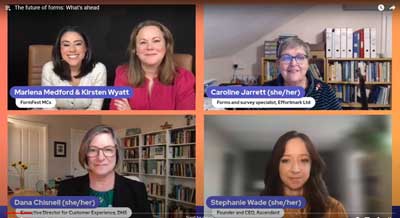 What do you do when you get an invitation to talk on your favourite topic with some of your favourite people? Say “yes”, of course.
What do you do when you get an invitation to talk on your favourite topic with some of your favourite people? Say “yes”, of course.
I was thrilled to be part of the Closing Keynote at FormFest2023 organised by Code for America and the Beeck Center for Social Impact + Innovation at Georgetown University. My fellow panellists were Dana Chisnell, Executive Director for Customer Experience at the US Department for Homeland Security, and Stephanie Wade, Founder and CEO of Ascendant.
Organisations continue to overlook the importance of fixing their forms
MCs Marlene Medford and Kirsten Wyatt began by asking us “which topics are overlooked in forms design?”
I wholeheartedly agreed with Dana’s point that we continue to disadvantage people by pushing to get every form online when so many folk have poor access to the technology and bandwidth they need to complete them.
Stephanie made a familiar point: know why you are asking. She said that asking clients to explain what they’ll do with the information their forms collect often reveals ‘legacy questions’: organisations collecting data without any intention of using it or any idea why they continue to ask for it.
I said that the thing that organisations most overlook is the forms themselves. Coincidentally, while we were being inspired at Formfest, media attention was wholly focused on an event taking place a few miles down the road from my home, at Bletchley Park, the home of the codebreakers. Elon Musk, UK Prime Minister Rishi Sunak, and a host of other ‘leaders’ spent two days discussing the future of AI.
“Where is our press?”, I asked. “All of these shiny new toys get a huge amount of attention. In our world of forms we understand the costs of getting it wrong, we understand the enormous impact on people’s lives, we understand the impact on the success of government policy, so where are the cameras?
“What are we overlooking? The forms! How can we amplify the sense of excitement and brilliance that we’ve been hearing today? How can we get people across government to care about the fact that quite small changes can create huge cost savings?”
(me, at Formfest 2023
Usability testing can create culture change
Marlene and Kirsten picked up on this point later in the session, asking us what we can do to shift culture so that people see the value of getting their forms right.
Dana reported on the success of a ‘burden reduction challenge’ for which teams across Homeland Security were challenged to look at processes in order to reduce by 20 million hours the ‘burden’ of forms to the public, estimated at 190 million hours a year. They actually achieved a 21 million hour reduction and are now aiming to reduce the burden by a further 10 million hours.
Stephanie spoke about the work she’s been doing, persuading the 180 agencies recruiting staff into government service to ‘flip’ the design of forms from representing the point of view of the hiring manager to the applicant’s viewpoint.
I suggested the most effective route to culture change happens when you get real forms data in front of people.
Harvest forms as they come in and then take that raw stuff into a meeting. Getting people to understand the richness of the problems can be really eye opening.
The equivalent for digital is to get people to watch users filling the forms in. Watching people struggle: that can be hearts and minds changing.”
(me, at FormFest 2023)
Watch our session and all the others
Find the sessions on YouTube
- our closing keynote The future of forms: what’s ahead?
- all the sessions FormFest 2023 sessions
Thanks again
My thanks to my fellow panellists, our hosts, and the organisers at Code for America and the Digital Service Network at the Beeck Center for Social Impact + Innovation.
